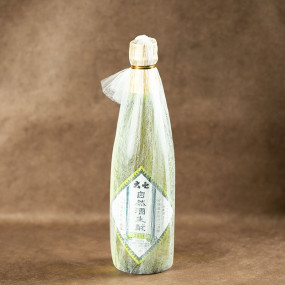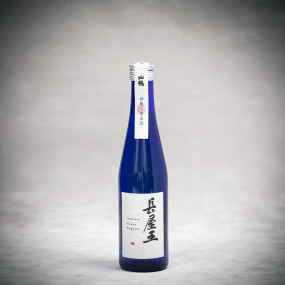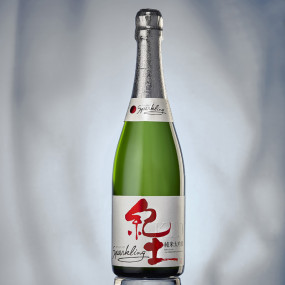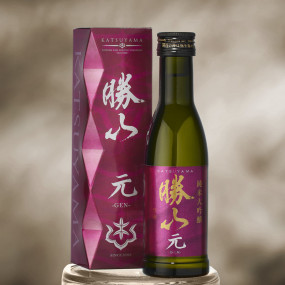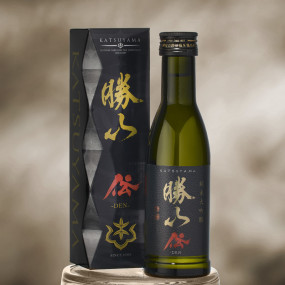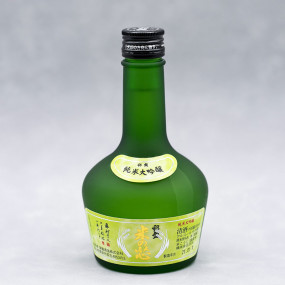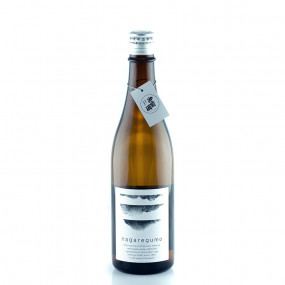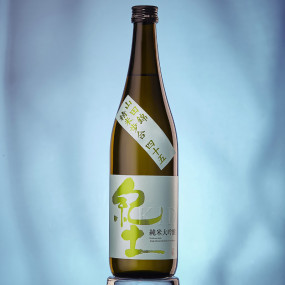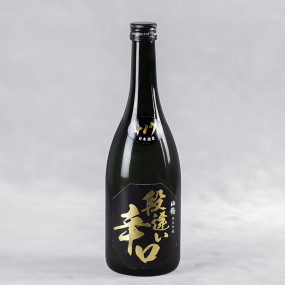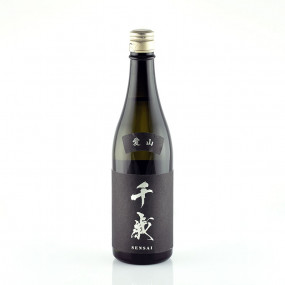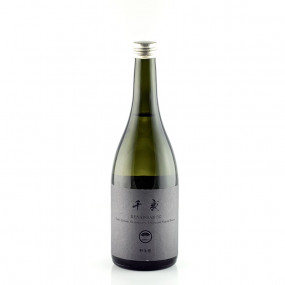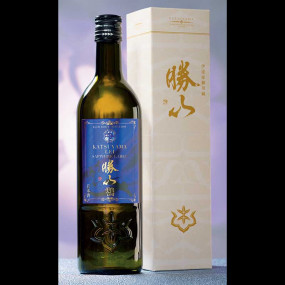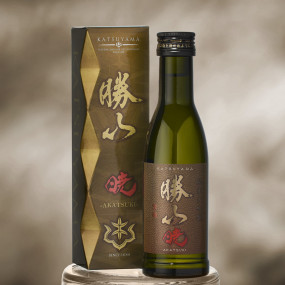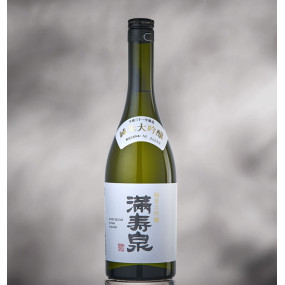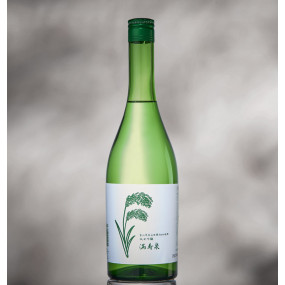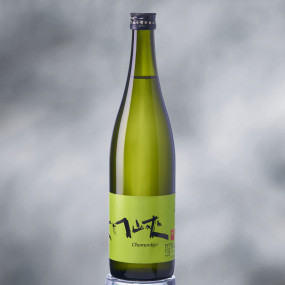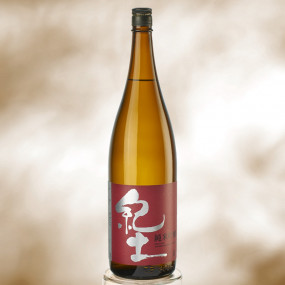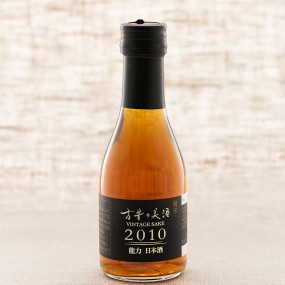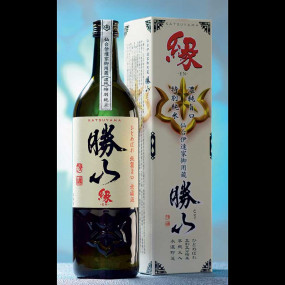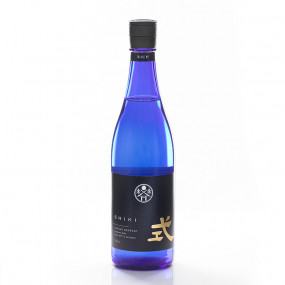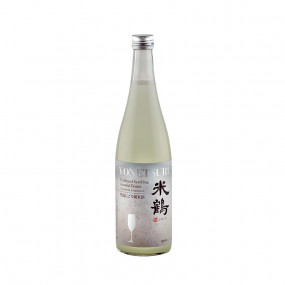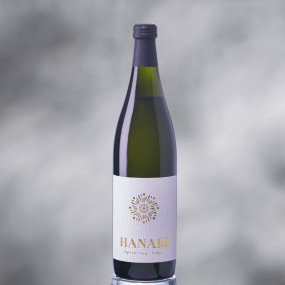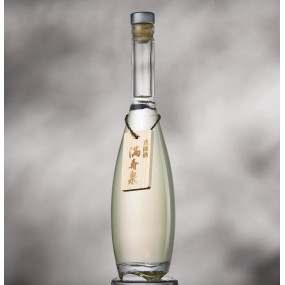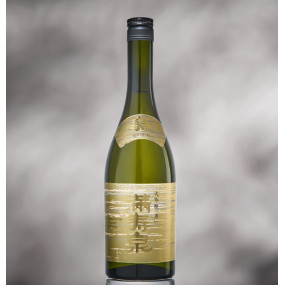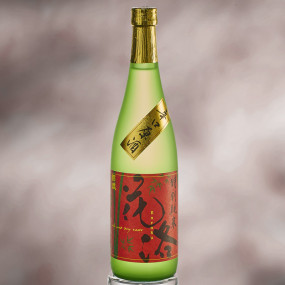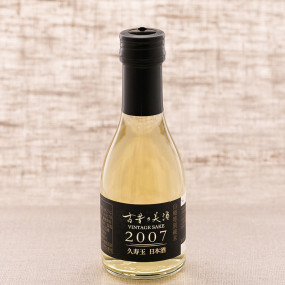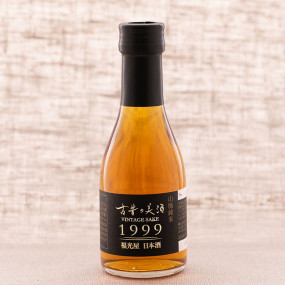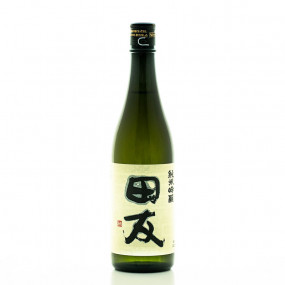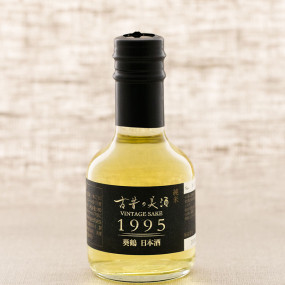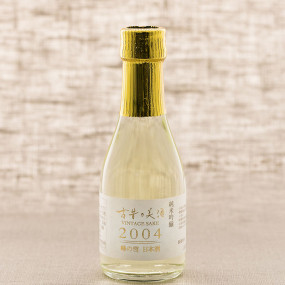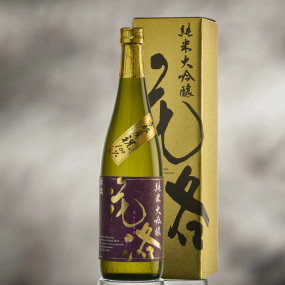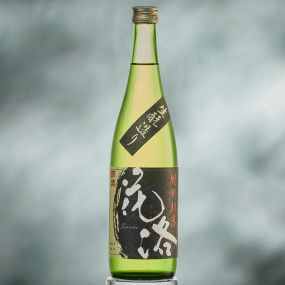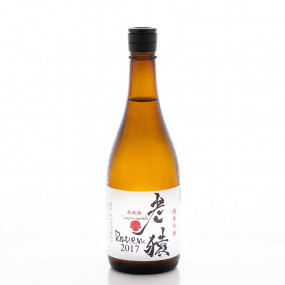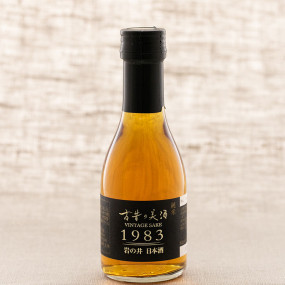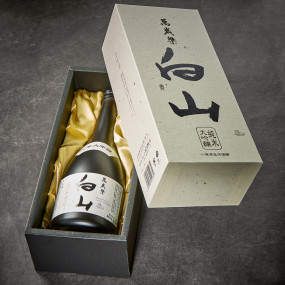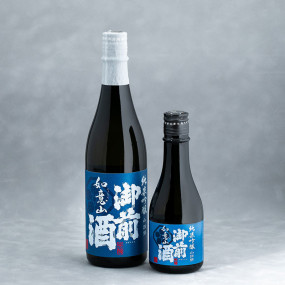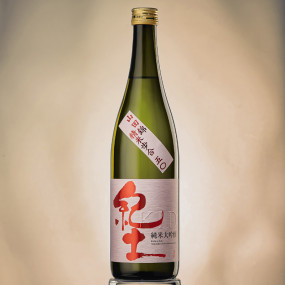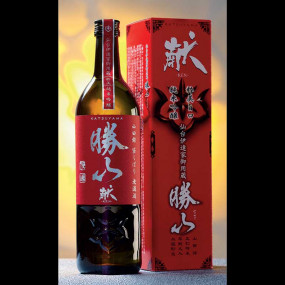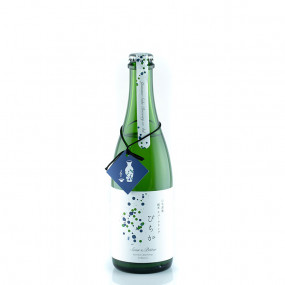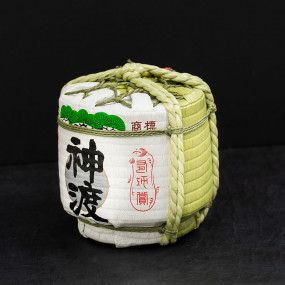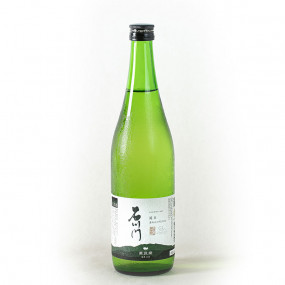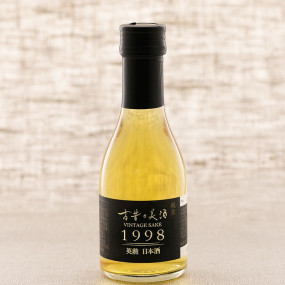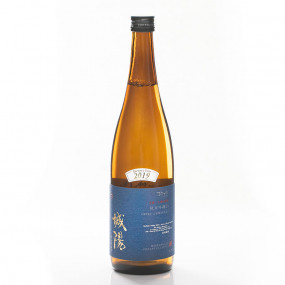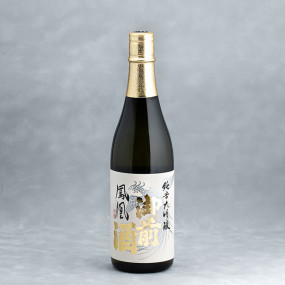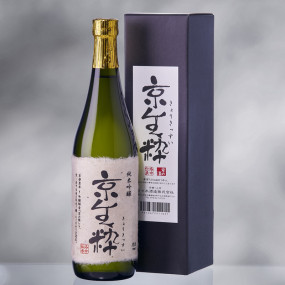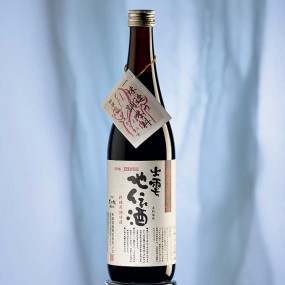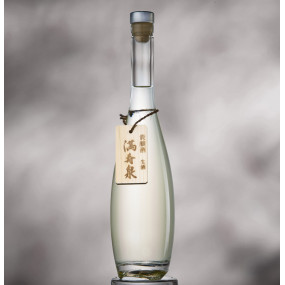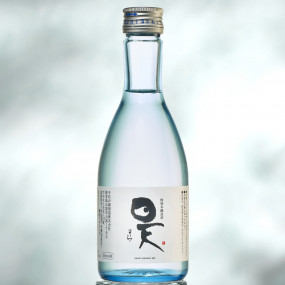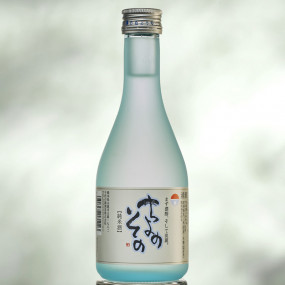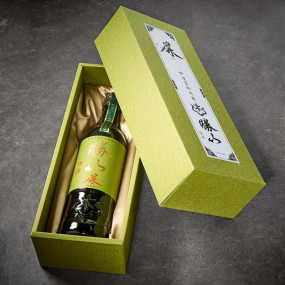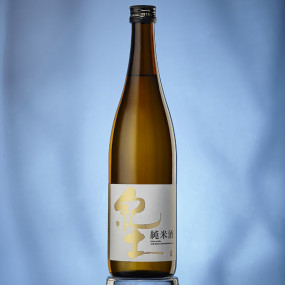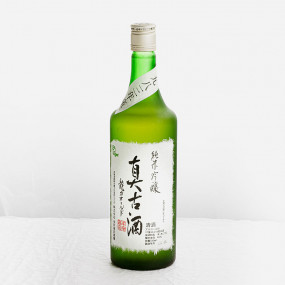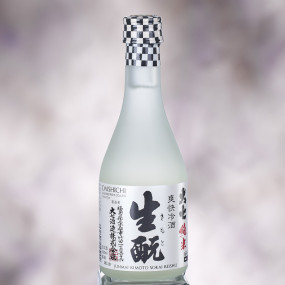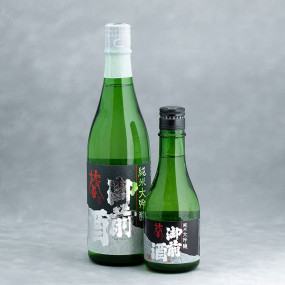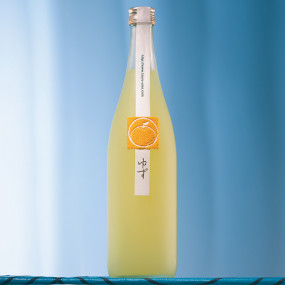Sake
EXCESSIVE CONSUMPTION OF ALCOHOL IS DANGEROUS FOR YOUR HEALTH. DRINK WITH MODERATION. CONSUMPTION OF ALCOHOLIC BEVERAGES DURING PREGNANCY, EVEN IN SMALL QUANTITY, CAN HAVE SEVERE CONSEQUENCES FOR THE CHILD’S HEALTH. THE SALE OF ALCOHOL IS FORBIDDEN TO MINORS UNDER AGE 18
-
-
"Prince Nagaya" Junmai Nagayao Sake
- In stock
From €29.90Nagayao or "Prince Nagaya" (Nagayao was a powerful personage in the Nara era, 684 - 729; it is said that he was the grandson of Emperor Tenmu) is a sake made by reproducing the brewing method used in the Nara era (around 700 AD). It is a "miracle sake" made with a 90% rice polishing rate and a one-step preparation.
This cannot be done in any other sake brewery in Japan since sake is usually made by further polishing the rice and brewing it in three stages. -
KID Junmaï Daiginjô sparkling sake
- In stock
From €19.90This sake, with a very nice texture, creamy, expresses peppery notes, very fresh, sometimes spicy, citrus (lemons) coconut, apple, white flowers, melon, kuzu starch, sake lees.
-
Gozenshu Gen Junmaï Daïginjô sake
- In stock
From €29.00The Gen denomination refers to the Genroku era, late seventeenth century, when Katsuyama House established and began to produce this style of sake.
-
-
Ginban Junmai Daiginjo Kome no sin sake
- In stock
From €27.00This premium sake originated after 1955, when Japan was growing and prospering rapidly. The bottle is reminiscent of a bottle of French cognac, a symbol of quality.
-
Nagaregumo Junmai Gozenshu sake
- In stock
From €30.00This sake honors the refinement of the ancient Bodaimoto brewing technique.
GOZENSHU nagaregumo is made from Omachi rice produced by Mame Farm, established for generations in Kurashiki City, Okayama Prefecture.
This sake reveals aromas of cereal and young pear.
-
KID Junmaï Daiginjô Semai Buai sake
- In stock
From €37.50This sake is characterized by very fruity notes of red apples and melon, with hints of honey.
-
Sake Junmai Ginjo Danchigai Karakuchi
- In stock
From €35.95Danchigai karakuchi means dramatically dry.
This super dry sake is proud of its Sake Meter value, or degree of sweetness of sake.
This value is over 17 degrees.
Distilled alcohol is usually added to make the sake dry, but this product is made only with rice. -
Sensai Aiyama Junmai Ginjo sake
- In stock
From €34.50This sake has a subtle, elegant aroma reminiscent of pine needles.
It is a dry sake with a slight bitterness, juicy acidity with the added umami of the rice, and a complex and refreshing aftertaste reminiscent of Chartreuse.
You will like the notes of mushroom, pine sap, small peppery, spicy touches, with a slight astringency on the finish. -
Sensai Renaissance Nojyoho Junmai sake
- In stock
From €33.25"Nojyoho" rice used to make this sake was born in Hyogo in 1933. At one time it was so popular that it was considered one of the two most popular varieties, along with Yamada-Nishiki, but it disappeared in the 1960s due to its high stature and difficulties in cultivation.
-
Gozenshu Tokubetsu Jumaï Ginjô Lei Sapphire sake
- In stock
From €52.00The name Lei refers to a sacred creature of Japanese mythology. The first brewing of the LEI series, started in 2011, stopped suddenly due to the Great East Japan Earthquake, was resumed in 2012.
-
Gozenshu Akatsuki Junmaï Daïginjô sake
- In stock
From €29.90This sake was created by delicate method based on new thinking to present extremely pure and tasty sake which never existed.
-
Masuizumi Junmaï Daiginjô sake
- In stock
From €65.00This sake daiginjo is characteristic of the know-how from Masuda Shuzo.
-
-
Chomonkyo Isehikari Junmaishu sake
- In stock
From €33.00This sake is produced from 100% Isehikari rice, free of chemical pesticide and fertilizers, which is certified by Yamaguchi Prefecture as "Eco 100", as well as the clear stream water of Aokage River that springs at the foot of Akiyoshidai, the prominent Karst Plateau of Japan.
-
-
Tatsuriki Junmai sake, vintage 2010
- In stock
From €49.50Tatsuriki Junmai sake is produced by Honda Shoten, a brewery located near the heart of Yamadanishiki rice production, known as king of sake rice. This brewery brings out the maximum authentic flavor of rice based on the idea that rice sake should have a rice flavor. Tatsuriki Junmai is only made with optimal rice for high quality sake production.
Tatsuriki Junmai sake is pure koshu. -
En Tokubetsu Junmaï sake
- In stock
From €29.50In Japanese, «EN» means link, relationship. Katsuyama has developed this Nihonshu En sake to bring people closer to each other.
-
-
Sparkling Yonetsuru Junmaishu Nigori Sake
- In stock
From €25.45This unfiltered sake has a pleasant fizz with fine bubbles. Nose expresses aromas of melon and cooked rice; palate is greedy, with a slight acidity and accents of yoghurt whey. Aftertaste is dry. We like the green pear and pinot gris notes.
-
Happôu Junmai Seishu "Hanabi" sparkling sake
- In stock
From €33.00This sparkling, pure rice sake maintains the carbon dioxide gas obtained through secondary fermentation in the bottle and creates sharp and yet delicate, fine texture bubbles. It is an easy-to-drink, new type of sake, with an elegant sweetness, which comes from the taste of rice and moderate acidity.
-
-
Masuizumi Daiginjô Kotobuki sake
- In stock
From €80.00We are here in the presence of a very voluptuous sake, with dominant fruity notes: fuji apple not too ripe, "piel de sapo melon or canary melon, white peach, banana.
-
-
Kusudama Junmai sake, vintage 2007
- In stock
From €49.00Often referred to as the little Kyoto of the Japanese Alps, Hida Takayama town is a popular district filled with Japanese charm. Our artisan brewer, Hirase Shuzo, was born there in 1623 for almost 400 years, over 15 generations, has never stopped brewing quality sake. The name Kusudama means medicine. This sake is made with groundwater from the Alps of northern Japan, Hida rice, and extremely cold annual temperatures. It is said that this sake is made with the hope that it will cure what ails you.
-
Fukumitsuya Junmai sake, vintage 1999
- In stock
From €60.00This brewery has the longest history in Kanazawa (Ishikawa Prefecture). The fresh and clear water that takes 100 years to flow from the sacred mountain Hakusan and the distinct 4-seasons climate contribute to unique rice cultivation and sake making. Traditional techniques continue to evolve and the brewery has focused entirely on Junmai sake since 2001.
Fukumitsuya Junmai sake is pure koshu. -
-
Aoitsuru Junmai sake, vintage 1995
- In stock
From €55.00Hyogo Prefecture, its mineral-rich viscous soil and weather with variations in temperature, is the production area for Yamada Nishiki, best sake brewing rice. Where fine, high-quality rice grows, there is a brewer. Inami shuzojo aims to produce locally brewed sake (the set of all environmental factors that affect a crop's phenotype) brewed locally.
This Aoitsuru Jumai sake is pure koshu. -
Minenoyuki Junmai Ginjo sake, vintage 2004
- In stock
From €48.50There are a lot of breweries in Kitakata, Fukushima Prefecture. In fact, you can call it the city of breweries. Our craftsman is the youngest brewery in town. Beverage naming "Minenoyuki" comes from Mt. Ide, located on the border with Yamagata. The brewery workers are young and undertake new brewing processes every year. Mead made only from honey extracted from the abundant nature at the foot of the mountain highlights the unique qualities of this brewery.
-
-
Tokubetsu Junmaï-shu Karaku Ki-Moto sake
- In stock
From €31.00This sake is brewed according to the traditional ancestral method (since the Edo era)" ki-moto "(yeasts and lactic acid bacteria grow naturally).
-
Koshu Junmai Ginjo Yamazaru Jukuseishu Rouen 2017 sake
- In stock
From €38.50The Yamazaru series developed by Brewer Nagayama Shuzo is identified as "Jizake", representative of "rich taste".
-
Iwanoi Junmai sake, vintage 1983
- In stock
From €65.00Our Iwanoi Junmai sake is made by the Iwase Shuzo house (Boso, Chiba Prefecture), a follower of traditional “Yamahai” production method (starter is made in a more laborious way, without adding lactic acid) . This longer fermentation method, now quite rare, gives the sake more pronounced, more complex aromatic notes.
Iwase has been producing this type of refined sake, known as “koshu”, since 1965.
-
-
-
KID Junmaï Daiginjô sake
- In stock
From €55.00This sake expresses a cocktail of fruits and flowers: cherry, strawberry, pear, apple, mango, melon, pineapple, banana, white flowers, honey.
-
-
Junmai Pizzica Sparkling Sake
- Available soon
From €26.40Junmai Pizzica Sparkling sake is made from Yamada-Nishiki rice, which has all the characteristics of a rice suitable for brewing sake, such as a large "white heart" (core rice grain), low fat and protein content and easy water absorption. It is also characterized by its high strength, which makes it easy to produce high quality koji (malted rice). It is a variety that expresses flavor, sweetness and fresh aroma of rice, with great smoothness and delicacy on the tongue.
-
Miwatari Junmaishu sake - Komodaru
- Available soon
From €72.00Komodaru or sakadaru is a barrel that has been used to store sake for over three hundred and fifty years. In its traditional and luxurious version, it is made of cedar wood. This type of cask has no pouring system or tap, so it must be filled and then sealed with a removable lid or opened by breaking the lid. This gives rise to a Shinto ceremony: kagami biraki. Komodaru is covered with a mat and a rope made of rice straw to protect it from the weather.
-
-
Eikun Junmai sake, vintage 1998
- Available soon
From €61.50Fushimi, Kyoto Prefecture, has been called the center of sake brewing for decades. The Saito brewery, producer of Eikun Junmai sake, has persevered, for more than 125 years, in the search for the ultimate flavor for the confection of its sakes, by using, for its brewing, mainly famous spring water Fushimi Nanai, pride of Fushimi.
Eikun Junmai sake has won the award for best Japanese sake for 14 years consecutively.
Eikun Jumai sake is pure koshu. -
-
Gozenshu Junmai Daiginjo "Ho-o" sake
- Available soon
From €71.00The origin of the name “Ho-o” refers to a legendary bird like the phoenix. “Ho-o” is made from the finest Yamadanishiki rice, richly polished at 40%.
-
-
Izumo Jidenshu cooking sake
- Available soon
From €19.00Izumo Jidenshu is a very special sake, produced in a unique way. It is an Izumo cooking sake with a centuries-old tradition, a unique Izuma ancient province heritage. At first it was a sake for drinking but it was later used in cooking.
-
-
Tokubetsu Honjôzô Sora sake
- Available soon
From €9.90This is a very good sake, very fresh, to discover the nihonshu.
-
Junmaishu cold sake
- Available soon
From €9.90Craftsmen of Chiyo no Sono craftsmen worked with a lot of know-how and mastery to make this soft-mouthed sake dominated by banana and ripe fruits notes.
-
Gozenshu Ren Junmaï Daiginjô sake
- Available soon
From €133.00The REN particle refers to the Noren, the traditional curtain hung at the entrance of restaurants in Japan, with the significance that this sake will weave the future.
-
KID Junmaïshu sake
- Available soon
From €23.50This sake is characterized by fresh and round notes, with a powerful nose of ripe banana.
-
-
-
-
Tsuru-ume Yuzu flavored sake
- Available soon
From €39.90Rich in aroma, scent and fragrance, it is 100% natural
LEARNING ABOUT SAKE
Your Japanese grocery store Nishikidôri tells you everything
Do you know Japanese sake?
Sake is becoming more and more appreciated and recognized for its qualities. Indeed, many sommeliers and chefs have been conquered by its gustative qualities.
Contrary to popular belief, Japanese sake rarely exceeds 16 degrees. Less acidic and sweeter than wine, it goes as well with Japanese cuisine as it does with Western cuisine from aperitif to dessert.
Just like wine, we will note during its tasting, the dress, the color, the nose, and the mouth.
The complexity, elegance, and diversity of its aromas are surprising and have nothing to envy wine (fruity, floral, vegetal, spicy...).
To obtain good sake, you need the know-how and technique of a master brewer as well as good ingredients.
The origin of Japanese sake
Japanese sake "nihonshu" is a rice alcohol obtained by fermentation.
Its origin dates back to more than 2000 years ago.
At that time, it was a beverage used to connect the human world with the spirit world, obtained by chewing rice which was then spat into jars to ferment.
It is from the 11th century that sake will be produced with methods similar to those of today. At first, reserved for the imperial court and religious rituals, sake was democratized over time until it became the national drink.
The ingredients of Japanese sake
- 20% rice
This is rice grown specifically for sake production. There are about a hundred varieties in Japan. It is characterized by a larger grain size than normal rice and a low protein content.
Among the most prestigious are Yamada-nishiki, and Gohyakuman-goku.
- 80% water
The best brewers are always located near a deep-water source. Its purity is essential, its iron content must be low not to affect its fragrance and color.
- The kôji and the yeasts
Koji is a fungus similar to that found on some cheeses. Sprinkled on the rice, it will help develop enzymes capable of digesting the starch of the rice to transform it into sugar molecules.
Yeast and lactic acid will then convert the sugar into alcohol.
There are many types of kôji and yeasts whose use will have an impact on the flavors that will be developed by the sake.
Japanese Sake Making Process
- The polishing of rice "semaibuai
The rice is first removed from its cuticle and then polished. There are several levels of polishing expressed as a percentage, which will determine the grade of the sake. The percentage of polishing expresses the volume of rice grain remaining.
For Junmai grade, the polishing percentage is 70% to 61%
For Ginjo grade, the polishing rate is 60% to 51%
For Daiginjo grade, the polishing rate is 50% or less
The more the rice is polished, the higher the starch concentration and the finer the sake.
- Washing, soaking, and cooking
Once polished, the rice must be washed to remove all impurities, then soaked in water. The art of the Master Tôji; a Japanese Master brewer; is to determine the soaking time and the quantity of water to be used essentially in the manufacturing process.
Then the rice is steamed.
- The motorcycle, start of fermentation
Part of the rice is then placed in a room where the humidity and heat are controlled. The rice sprinkled with kôji will be stirred by hand and then left to rest for 3 days in order to promote the development of mushrooms.
After this step, the master tôji transfers the rice to a vat and adds the yeast to start the fermentation process.
- Putting in a vat
The moto is then transferred to the larger fermentation vats in which water and rice are gradually added.
This fermentation process lasts from 3 to 4 weeks.
Each tank is regularly mixed.
- Pressing, filtration, bottling
The contents of the vats are pressed to recover the dregs of the rice which form a paste (kasu sake) often used in cooking or drinking.
Finally, the sake is filtered then pasteurized, and stored for about 6 months before bottling.
The manufacturing methods
This manufacturing process has evolved over time. Some brewers still use traditional methods such as Kimoto or Gozenshu. They represent about 10% of the production. They use longer processes and let the indigenous yeast and lactic acid bacteria develop.
The main categories of Japanese sake
- Futsushu: ordinary quality sake related to table wine. There is no polishing process.
- Honjôzô: a little distilled alcohol is added at the end of the brewing process by the brewmaster to obtain a lighter and more aromatic sake.
- Junmai: unlike Honjôzô, no alcohol is added which gives a more acidic sake.
- Ginjô: superior class’s sake, the rice polishing is equal or lower than 60% with a low-temperature fermentation.
- Daiginjô: same class as Ginjô but with a polishing equal or lower than 50%. It is very refined, balanced, and aromatic.
- Nigori: less filtered, it is characterized by a cloudy color due to the rice residues.
- Kimoto/Gozenshu: no lactic acid is added. It takes longer to make and develops a richer and more pronounced taste.
- Tokubetsu: Sake made with a different type of rice or a different method of production.
- Sparkling: Sake that sparkles either naturally or by fermentation or by adding gas.
Depending on its manufacturing process, a sake may belong to several categories.
How to store a bottle of sake?
Sake keeps very well in the refrigerator at about 5 degrees. As for wine, it is recommended to consume it quickly after opening.
Note that sake does not contain any preservatives (such as sulfites) because it is pasteurized.
How to choose your sake?
Honjôzô has a light and fresh taste.
Junmai and Kimoto are richer and more generous. More acidic with more body they are perfect to accompany meals.
Ginjô and Daiginjô are very aromatic and develop more floral or fruity notes.
What is the best temperature for tasting sake?
Sake has the particularity of being consumed at different temperatures ranging from 5° to 55° C. However, today the vast majority of sake is served chilled or at room temperature to enhance its aroma and elegance. The recommended temperatures are indicated on the bottles.
Can I drink sake in a wine glass?
Wine glasses are increasingly used to allow the aromas to develop and express themselves fully, especially for the higher categories of sake.
What are the best matches?
Because it is less acidic than wine and has no tannin, sake can be paired more easily with many dishes, from appetizers to desserts.
Raw ham, foie gras, oysters, scallops, fish, red or white meat, cheese, chocolate...
How is Japanese sake drunk?
Sake can be consumed as an aperitif, digestive or to accompany dishes. It can be drunk either cold or hot, depending on your preferences.
What is the alcohol content of sake?
Contrary to popular belief, Japanese sake rarely exceeds 16 degrees.
What is the price of a bottle of sake?
The price of a bottle of sake varies between 10 euros and a hundred euros, but some very rare bottles can be as much as 400 euros.
excluding specials

